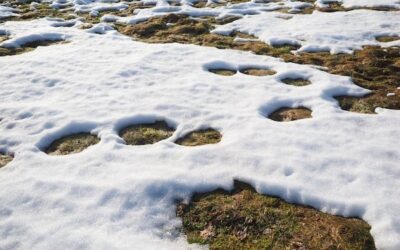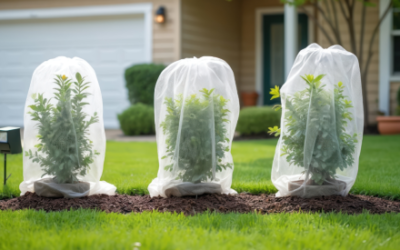Does your lawn continually retain water after rainfall? It is probably waterlogged, and this can lead to several problems in your yard, including foundation damage. This problem is generally due to poor drainage caused by a number of factors, and the good news is this problem can be both repaired and prevented. Follow these 5 tips to prevent a soggy lawn after rainfall, and greatly help your landscape.
1. Aerate Your Lawn
Lawns can become waterlogged in this condition due to soil compaction, caused by rainfall. This occurs as soil particles are being pressed together, leaving the soil without enough space for air and water to pass through. As this happens, water will pool on the surface, which can kill the grass beneath it.
Aerating simply means making small, deep, holes through the grass down into the soil. These holes allow air, water, and nutrients to make their way into the soil. Aeration helps with lawn drainage and absorption, stimulates new root growth, and increases the availability of nutrients.
2. Apply Compost and Sand
After aerating, apply compost to your lawn. You can apply it in combination with horticultural sand in a 1-to-1 ratio. Both compost and sand help fill in the void that aeration creates, and this helps to maintain an open soil structure. Beneficial microbes in the compost will work to de-compact soil particles, improving drainage and nourishing the soil.
3. Create a Rain Garden
Building a rain garden can capture rainwater runoff and divert it into a planting bed. The bed absorbs and cleans the water by slowly filtering it into the surrounding soil. You can choose from a variety of water-loving plants to create your Rain Garden, such as swamp milkweed, cardinal flower, switchgrass, scarlet bee balm, and blue star. Building a rain garden is a great way to reduce flooding in your yard. It is helpful in filtering out pollution in the water, and it provides a great habitat for pollinators.
4. Install a Dry Well
If your lawn is regularly being flooded after rainfall, and the rainwater soaks into the ground relatively quickly, your yard may benefit from dry wells. Dry wells, like rain gardens, are in low-lying areas and collect water. However, rather than being used to grow plants, the excess water is collected in buried tanks and is slowly released back into the surrounding soil.
5. Regrade the Lawn
A more drastic measure you can take to help your waterlogged lawn is to reshape your yard. If pooling water is a consistent problem, and other methods are not helping enough, regrading may be the best approach. This method will require professional help. Your contractor will survey the property to find the source of the problem and then calculate the grade line. They will then use specialized equipment to even out the low spots and the high spots, and ensure that water is flowing properly.
If you are tired of dealing with a soggy lawn, and need professional help, Jack’s Lawn Care & Landscaping is here to give your lawn the individual care it needs. We will help find problem areas and offer the best tips to prevent a soggy lawn after rainfall. To learn more about the services we provide, click here or give us a call today at (434) 987-4451.



